
-
private intelligence companies the new spymasters
engelsbergideas.com How private intelligence companies became the new spymastersIn a world awash with digital data, private intelligence companies now compete with state agencies, turning everyone into potential spies and transforming the age-old craft of espionage into a high-stakes technological arms race.
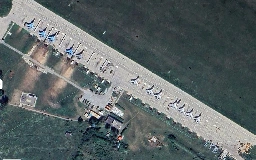
"At the same time, daily life relies more than ever on digital technology: more things run on software (fridges, cars, phones), those things have a greater array of sensors (GPS receivers and radio transmitters) and they are increasingly connected, often over the internet, allowing data, often embodying our most personal secrets, to flow to and fro. The paradox of the modern world is that, while we have more means to keep our data secret, there is so much more data to contend with and so many more places from where it can seep out into the world, where a sprawling ecosystem of private intelligence can collect, analyse and use it."
- www.foreignaffairs.com Israel Is Winning
But lasting victory against Hamas will require installing new leadership in Gaza.
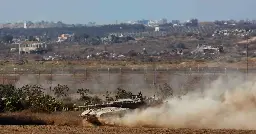
But Lasting Victory Against Hamas Will Require Installing New Leadership in Gaza
-
The United States has approved $20 billion in additional weapons sales to Israel despite federal laws that prohibit arms transfers to military units accused of gross human rights violations.
www.democracynow.org Biden Administration Approves $20 Billion in Additional Weapons Sales to IsraelThe United States has approved $20 billion in additional weapons sales to Israel despite federal laws that prohibit arms transfers to military units accused of gross human rights violations. The State Department’s approval of the sales came just a day after Secretary of State Antony Blinken commemor...
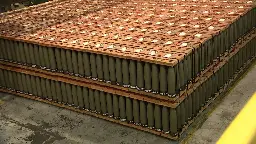
- www.zerohedge.com Riots Erupt At Israeli Military Bases After IDF Reservists Arrested For Sex Abuse Of Prisoner
ZeroHedge - On a long enough timeline, the survival rate for everyone drops to zero

- www.aa.com.tr 5 countries urge citizens to leave Lebanon amid fears of war with Israel
Germany, Netherlands, Canada, North Macedonia, Kuwait ask nationals to leave Lebanon - Anadolu Ajansı

- www.bloomberg.com Hungary Embraces Chinese Loan Financing After €1 Billion Deal
Hungary said it took a €1 billion ($1.1 billion) loan in April from China, adding that such financing is likely to become more widespread in the future as economic links with the Asian nation grow.
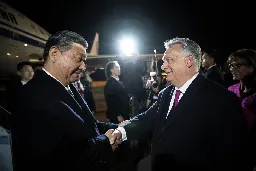
-
PUTIN AND CHINA SHOCK PETRODOLLAR, U.S. EMPIRE DECLINES: WWIII LOOMS? | BEN NORTON & LEE CAMP
YouTube Video
Click to view this content.
cross-posted from: https://lemmy.world/post/17956373
> >Journalism and Analysis from an Anti-imperialist Perspective > > >Ben Norton of Geopolitical Economy Report ( / @geopoliticaleconomyre... ) and Lee Camp of Dangerous ideas ( / @realleecamp ) join to discuss the fast pace of developments related to de-dollarization, the decline of U.S. empire, and the rise of multipolarity. This discussion will run the gambit of not just geopolitics but the interplay of U.S. domestic crisis and the global order. > > >#Russia #China #petrodollar >
-
Putin, China Ready Nuclear War | Scott Ritter: It's No Bluff | Yemen Deals Major Blow To Israel
YouTube Video
Click to view this content.
cross-posted from: https://lemmy.world/post/17794991
> >Journalism and Analysis from an Anti-imperialist Perspective > > >In this special Saturday livestream, we will dive deep into the growing threat of nuclear conflict as recent provocations from NATO have Russia taking the gloves off...and China is joining in?!? Meanwhile, Yemen has dealt a mega blow to Israel, penetrating its defensives thousands of kilometers away. What does all of this mean for the future of the world order? While all eyes are on the US elections, this stream will delineate the geopolitical developments the establishment does not what you to know about. > > >PUTIN, CHINA READY NUCLEAR WAR | SCOTT RITTER REACTS | YEMEN-ISRAEL WAR EXPLODES
---
>Summary >1. The drone strike by Yemen signifies a dangerous escalation in regional hostilities, challenging Israel’s military dominance and strategy. >1. Israel’s retaliatory actions may provoke further aggression from Yemen and allied forces, potentially leading to a protracted conflict. >1. The involvement of the axis of resistance suggests a united front against Israeli operations, complicating military responses. >1. China’s and Russia’s commitment to international law highlights a shift in global power dynamics, as they may challenge US influence. >1. The uncertain response from the US and NATO could lead to unpredictable military actions, increasing global instability. >1. A post-Ukraine order may undermine US and NATO dominance, resulting in a more volatile international landscape. >1. Continuous military engagements in the region could escalate into broader conflicts, necessitating international attention and intervention.
-
PEPE ESCOBAR: RUSSIA & NATO ON BRINK OF ALL-OUT WAR AND PUTIN ISN'T BLUFFING
YouTube Video
Click to view this content.
cross-posted from: https://lemmy.world/post/17677700
> >Journalism and Analysis from an Anti-imperialist Perspective > > >Journalist and geopolitical analyst Pepe Escobar (https://t.me/rocknrollgeopolitics on Telegram) and ( / realpepeescobar ) joins to discuss new developments in the multipolar world as the Ukraine conflict reaches a climax toward Russian victory, changing everything about the geopolitical landscape. This conversation will illuminate the prospects and challenges ahead for the rising superpowers to the East and their efforts to build an independent military, financial, and political architecture.
-
China's Military Deployed Right Next to NATO and EU Border

YouTube Video
Click to view this content.
-
How Gaddafi Was Wrongfully Branded a Dictator and Killed by the U.S.

YouTube Video
Click to view this content.
- www.972mag.com ‘I’m bored, so I shoot’: The Israeli army’s approval of free-for-all violence in Gaza
Israeli soldiers describe the near-total absence of firing regulations in the Gaza war, with troops shooting as they please.
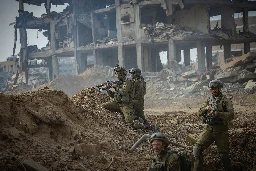
-
The war in Ukraine and the decline of the West | #1623 with Douglas Macgregor
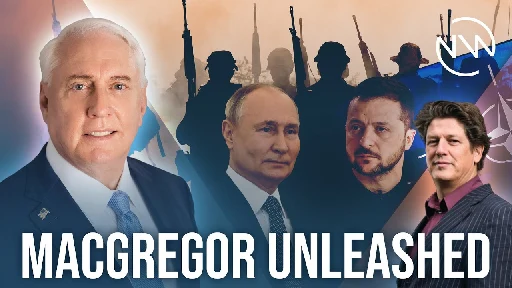
YouTube Video
Click to view this content.
cross-posted from: https://lemmy.world/post/17344087
> cross-posted from: https://lemmy.world/post/16967160 > > > The war in Ukraine and the decline of the West | #1623 with Douglas Macgregor [02:01:29 | JUN 25 24 | De Nieuwe Wereld TV] > > > > >Adrian Verbrugge speaks with colonel Douglas Macgregor, decorated combat veteran in the US Army and former senior advisor to the Secretary of Defense under Donald Trump. > > > > >Macgregor is the author of five books, a PhD, and an expert in strategy, policy, and defense. The conversation centers around 'Margin of Victory. Five Battles that Changed the Face of Modern War', a book by Colonel McGregor that was published ain 2016. > > > > >This conversation was recorded at the studio of 'Our Country, Our Choice' in Orlando, Florida.
-
US sailors gripe about lengthy mission to protect Israel
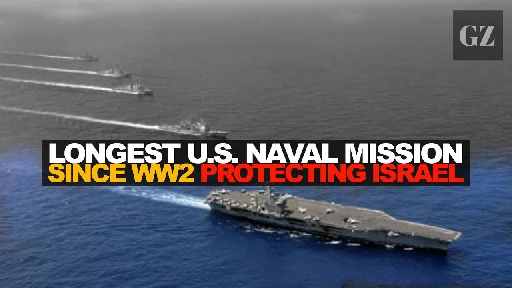
YouTube Video
Click to view this content.
-
In the New Cold War, Europe’s Approach to China Is Already Outdated, Researchers Say
thediplomat.com In the New Cold War, Europe’s Approach to China Is Already OutdatedThe hope that Beijing would distance itself, however minimally, from Moscow has finally been extinguished. Europe needs to adjust its approach accordingly.
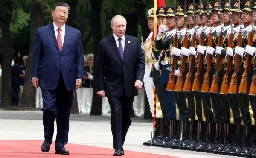
cross-posted from: https://feddit.de/post/12947956
> In the New Cold War, Europe’s Approach to China Is Already Outdated, Researchers Say > > Archived link > > The hope that Beijing would distance itself, however minimally, from Moscow has finally been extinguished. Europe needs to adjust its approach accordingly. > > Written by Maximilian Mayer, professor of International Relations and the Global Politics of Technology at the University of Bonn, Germany • Emilian Kavalski, NAWA Chair professor at the Jagiellonian University in Krakow. Poland. > > That Russian President Vladimir Putin is preparing for a long war not just in Ukraine, but against Western democracies more broadly, should hardly be news, even if many in Europe and North America refuse to acknowledge this fact. At least since the 2008 Russian intervention in the conflict in Georgia, Putin has condoned a series of both hot and hybrid warfare campaigns to weaken the democratic fabric of countries in Russia’s vicinity and further afield. It was recently revealed that on the eve of the full-scale invasion of Ukraine in February 2022, Russia launched a spacecraft to test nuclear anti-satellite weapons, further evidence of Moscow’s plan for long-term confrontation with the West, beyond what it considers its “near abroad.” > > Yet, that China is willing to fully back Putin’s effort to threaten and undermine liberal democratic states is certainly a newsflash. Ever since Russia’s full-scale attack on Ukraine in February 2022, Beijing has been treading carefully to avoid perceptions that it is overtly supporting Moscow and has been claiming to occupy a neutral position – even if China has been leaning toward Russia’s side. > > The reason seems obvious. Despite increasing tariffs, anti-subsidy probes, and European derisking strategies, both China’s export-oriented economy and the bottom line of most Chinese companies are still tied to trade with Western firms as part of global supply chains. It was therefore common sense to assume that Beijing would move cautiously to avoid jeopardizing its economic security in the context of an increasingly unpredictable domestic market and escalating economic tensions with the United States. > > However, either such assessments have been misplaced or China’s wariness appears to have evaporated. The spark of hope that Beijing would distance itself, however minimally, from Moscow has been finally extinguished. > > The most recent joint diplomatic statement by Putin and Chinese President Xi Jinping suggests that China and Russia, although not formally allies, have formed a bloc-like alliance that is geared toward undermining security in Europe. The joint statement issued after last month’s meeting between Putin and Xi in Beijing explicitly stated that both partners “believe that all nuclear weapons states… should refrain from infringing upon each other’s vital interests through the expansion of military alliances and coalitions, as well as the establishment of military bases in close proximity to the borders of the other nuclear weapons states.” In other words, this passage spells out what China understands by insisting upon the “legitimate security interests and concerns of all countries.” > > The comprehensive clarity of the lengthy statement goes beyond the mere reiteration of Putin’s talking points. It boils down to an explicit statement of intent – namely, Beijing’s intent to work with Moscow in undermining Europe’s security at a moment when the EU has communicated that Russia’s war against Ukraine is an “existential” threat to Europe. China is not only ready to challenge NATO’s guarantee for the security of states in Eastern Europe, but also the increasing activities of the Western European members of the alliance on NATO’s eastern flank in support of Ukraine. > > It is significant that Xi’s meeting with Putin came on the heels of the Chinese leader’s visit to Serbia and Hungary. This trip was indicative of China’s strategic direction. Xi visited Serbia on the 25th anniversary of NATO’s bombing of the Chinese embassy in Belgrade, something that he stated the Chinese people will “never forget.” In Hungary, Xi signed a new security pact, which would allow Chinese law enforcement to conduct patrols in the country and install surveillance equipment. However, as revelations of a number of secret annexes to the pact suggest, Chinese police officers may avail themselves of the Schengen travel arrangements and visit other European countries to conduct “secret missions,” including arresting dissidents and bringing them back to Hungary before taking them to China. > > The joint statement between Putin and Xi is quite unambiguous that the strategic infrastructure of Western “military alliances” is perceived as a threat to both China and Russia. The call for the establishment of loosely defined buffer zones in the peripheries of nuclear powers is surprising, in that it goes against China’s self-avowed principle of non-interference in the domestic affairs of states and contradicts the habitually repeated Chinese warnings against “Cold War mentality.” More than that, this statement also indicates that Beijing and Moscow are throwing under the bus the national sovereignty of the smaller states in between. Instead, might makes right – small states will be subject to the whims of great powers and their spheres of influence. > > It is not far-fetched to interpret the Sino-Russian statement as Beijing’s legitimization of Moscow’s brinkmanship in Europe, short of using nuclear weapons. It is no coincidence, that immediately after the Putin-Xi meeting, Russia’s defense ministry posted a draft proposal for the revision of the country’s maritime borders in the eastern Baltic Sea. A few days later, in another test of Western resolve, Russian border guards removed dozens of light buoys demarcating the Estonia-Russia border along the Narva River. > > While the full implications of the joint statement will become more obvious in the coming weeks and months, several takeaways help to shed light on the contours of Sino-European relations during the new Cold War. > > First, in the midst of mutual retaliatory rhetoric about trade restrictions, this is China’s loudest signal yet that its strategic outlook is officially framed from the perspective of a new Cold War with the West. While Russia might be playing a “junior partner” in the alliance, it is Beijing that is following Moscow’s lead into uncompromising strategic antagonism with the West and especially the European Union. This does not mean that there is ample trust between Russia and China, but the logic of a bloc confrontation is underpinning Beijing’s commitment to cooperate with Moscow ever more closely. The symbolic gesture of Putin’s official visit to the Harbin Institute of Technology, which could indicate more Russian access to Chinese defense technology, has not been lost on European observers. > > In the new Cold War, Russia is more important to the Chinese leadership than Europe. The relevance of bilateral relations goes beyond the reality of growing economic complementarities and trade figures between the two Eurasian giants. The joint statement is the strongest indication yet that China is not averse to forming a military alliance with Russia. The document clearly spells out that bloc confrontation is the new game in town, despite Chinese reassurances about further economic opening and a charm offensive to European businesses. In France, Xi only offered a vague answer to European Commission President Ursula von der Leyen’s plea to limit the deliveries of dual use goods to Russia. Beijing, it seems, has already priced in the inadvertent “loss of Europe” as the cost of its partnership with Moscow. > > In the new Cold War, Eastern Europe and the Indo-Pacific are part of a united Eurasian strategic theater. Geographically, just like the 20th-century Cold War, the new one reflects the expansive logic of malleable buffer zones. The fault lines of the Sino-Russian confrontation with the West follow a north-south gradient across the landmass of Eastern Europe and a southwest-northeast gradient from the South China Sea to the Korean Peninsula. Although China has officially always rejected the connections between the Ukraine and Taiwan crises, this linkage is now more conspicuous than ever before. While such a scenario will probably be hard to swallow for Europe, it is becoming hard to ignore that China will be part of any future European security order. Europe, given its overreliance on U.S. security provision, has less wiggle room and no choice but to get closer with the United States. > > Europe’s security requires significant realignment of its strategic focus. Faced with large-scale crises such as migration, economic inequality, climate change, and populism, European policymakers struggle to formulate a coherent strategy. The prospect of a strengthened Russian economy and sustained armed conflict in Ukraine presents new challenges that call on Europe to enhance its military capabilities and seriously prepare for a range of contingencies. It appears that both Moscow and Beijing are ready for the turbulence of the new Cold War. European leaders are still to fully grasp its reality. > > The joint China-Russia statement marks a world political closure. Bloc confrontation is a new reality, although the rest of the world tries as hard as possible to avoid taking sides. In the absence of significant hard power, Europe does not have the luxury of contemplating a neutral position. Economic interdependencies with China become more problematic. Trade and security policies are now not only seen as intimately entangled, but also point in increasingly contradictory directions. Current attempts at decoupling between the economies of China and the West will thus likely intensify, rendering the management of conflicts increasingly difficult. > > As the West might fracture under the pressure of multiple crises and see its resolve buckle through the constant disinformation campaigns of Russia and China, it is difficult to anticipate what trajectories the confrontation will take. In this precarious new Cold War scenario, Europe has to consider both the attitude of a new U.S. administration and Chinese views on such contingencies. > > For instance, what would leaders in Beijing view a possible “win” for China in Ukraine? Some Chinese experts are betting on a “Korean” type solution for the conflict. This would include a buffer zone between Russia and NATO in Europe and a demilitarized zone partitioning Ukrainian territory. As a result, Russia would be in a stronger position to seek domination over Eastern Europe’s states as well as pressure NATO to roll back its membership to pre-1994 levels. > > The most pressing issue along the two geographical fault lines in the coming years is keeping the new Cold War “cold” and preventing it from becoming a full-blown global hot war. Overall, there are reasons not to be overly pessimistic. The logic of nuclear deterrence is functional. China and the United States are ill-prepared to fight a war, and the risk of skirmishes in the South China Sea makes both sides more restrained. However, escalatory trends remain and flash points are multiplying, while mechanisms to avoid escalation such as monitoring, mutual surveillance programs, and regular military-to-military talks are few and far between. > > For Europe, to maintain a sense of pragmatic optimisms is more difficult. China and the United States can rely on historical precedent to ensure their coexistence as superpowers and create, for example, their own version of SALT. Europe, however, does not possess historical templates and its tripartite approach to China – as partner, competitor, and rival – is woefully outdated because it lacks a security angle altogether. > > Europe needs to quickly come to grips with a China that both openly supports Russia’s imperial war and works with Moscow to end NATO’s presence in Eastern Europe.
- www.aljazeera.com Colombia to cut diplomatic ties with Israel over Gaza war, Petro says
Colombian President Gustavo Petro, a staunch critic of Israel’s war in Gaza, says the Israeli government is ‘genocidal’.

cross-posted from: https://lemmy.ml/post/15135996
> Colombia to cut diplomatic ties with Israel over Gaza war, Petro says > > > Colombian President Gustavo Petro has announced plans to cut diplomatic ties with Israel over its war in the Gaza Strip, which human rights advocates and other experts have warned could amount to genocide. > > > > Speaking to a crowd marking International Workers’ Day in Bogota on Wednesday, Petro said countries cannot be passive in the face of the crisis unfolding in Gaza. > > > > “Here in front of you, the government of change, of the president of the republic, announces that tomorrow we will break diplomatic relations with the state of Israel … for having a government, for having a president who is genocidal,” Petro said. > > > >A left-wing leader who came to power in 2022, Petro is considered part of a progressive wave known as the “pink tide” in Latin America. He has been one of the region’s most vocal critics of Israel since the start of the Gaza war. > > > > In October, just days after the conflict began, Israel said it was “halting security exports” to Colombia after Petro accused Israeli Defence Minister Yoav Gallant of using language similar to what the “Nazis said of the Jews”. > > > And in February, Colombia suspended Israeli weapons purchases after Israeli forces opened fire on Palestinians scrambling for food aid in Gaza — an event Petro said “recalls the Holocaust”. > > > Meanwhile, in early April, the Colombian government requested to join a case at the International Court of Justice (ICJ) accusing Israel of genocide. > > > >“Colombia’s ultimate goal in this endeavour is to ensure the urgent and fullest possible protection for Palestinians in Gaza, in particular such vulnerable populations as women, children, persons with disabilities and the elderly,” the country said. > > Archive link
-
The EU should stop ‘westsplaining’ and listen to its smaller eastern members – they saw the Ukraine war coming, researcher says
theconversation.com The EU should stop ‘westsplaining’ and listen to its smaller eastern members – they saw the Ukraine war comingLithuania doesn’t often set the agenda, yet it has been warning that Russia would invade Ukraine since 2008.
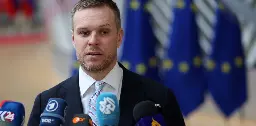
cross-posted from: https://feddit.de/post/11465777
> The EU should stop ‘westsplaining’ and listen to its smaller eastern members – they saw the Ukraine war coming, researcher says > > There is a "stark difference of opinion between countries like Lithuania, Latvia, Estonia, Poland and the Czech Republic as compared to western European countries such as France or Germany", writes Viktoriia Lapa from the Institute for European Policymaking at the Bocconi University in Italy, arguing that “westsplaining” still prevails in the European Union. > > "By 2022, Russia had launched a full-scale attack against Ukraine. Words of support came from every direction but concrete support was less forthcoming. During the first days of the war, Germany refused to send weapons to Ukraine and even prevented Estonia from sending its old howitzer artillery weapons by withholding approval," Lapa writes. > > "Lithuania, meanwhile, along with Latvia, Estonia and Poland, were sounding the alarm about the threat the situation posed to the rest of the region and called for Europe to support Ukraine “with every means available”. For many in the region, Europe should commit unambiguously to helping Ukraine win the war." > > "Until recently, even French president Emmanuel Macron was suggesting that Ukraine should compromise on some of its sovereignty to accommodate Putin’s demands. Such comments were coldly received in Baltic and eastern European states." > > "When Macron changed his strategy to say that he did not rule out sending troops to Ukraine, he faced backlash from several European capitals. However, he found an ally in Lithuania." > > "In a positive sign of recognition, EU Commission president Ursula Von der Leyen mentioned in her annual state of the union address in 2022: 'We should have listened to the voices inside our union – in Poland, in the Baltics, and all across central and eastern Europe.'"
- www.euractiv.com Researchers urge Europe to 'embrace' deindustrialisation
Faced with global competition from countries with cheap renewable energy, the EU should embrace a partial deindustrialisation rather than subsidise uncompetitive industries, according to a new report from the Potsdam Institute for Climate Impact Research published on Wednesday (24 April).

cross-posted from: https://lemmy.ml/post/14895966
> Researchers urge Europe to 'embrace' deindustrialisation
- www.euronews.com EU looking to expand sanctions on Iran following attack on Israel
The European Union will "start the necessary work" to hit Iran with heavier sanctions after Saturday's aerial attack on Israel, the bloc's top diplomat has said. #EuropeNews
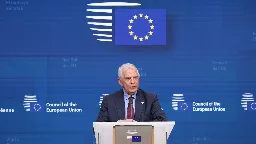
cross-posted from: https://lemmy.world/post/14378348
> EU looking to expand sanctions on Iran following attack on Israel > > The European Union will "start the necessary work" to hit Iran with heavier sanctions after Saturday's aerial attack on Israel, the bloc's top diplomat has said. > > Speaking following an exceptional virtual meeting of EU foreign ministers on Tuesday, Josep Borrell said he would ask his services to study the possibility of expanding existing EU sanctions against Iranian drone technology. > > It would see the current sanctions regime - established in July 2023 to punish Iran for aiding Putin's war machine with unmanned drones - expanded to include missiles and to also cover Iran's proxies in the region. > > The bloc would also weigh the possibility of listing the Iranian Revolutionary Guard as a terrorist organisation, he said, while stressing that such a move would be difficult since the military branch has not yet been associated with an act of terrorism in any of the EU's member states.
-
cross-posted from: https://lemy.lol/post/22317595
- www.economist.com Why Xi Jinping sounds friendlier to America
A tactical move to boost China’s economic and diplomatic interests
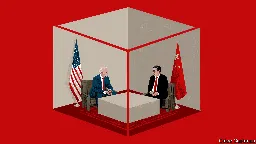
A tactical move to boost China’s economic and diplomatic interests
When invited to sum up the state of China’s relations with America, a close observer in Beijing drops a surprising literary reference, comparing the countries to damned souls sent to Hell in “Huis Clos” (“No Exit”), a play by Jean-Paul Sartre. In the gloomy Frenchman’s masterwork, Hell turns out to be an antique-filled sitting room peopled by unlikeable strangers. These wretches come to realise that they must endure each other’s company, and mutual contempt, for all eternity. The afterlife needs no red-hot pokers to be a torment, gasps one of Sartre’s sinners: “Hell is—other people!” The reference to existential angst by the observer in Beijing is more than startling. It is meant to be encouraging.
The case for optimism runs as follows. For two years Sino-American relations were dangerously dysfunctional. To protest, successively, against a visit to Taiwan by the then-speaker of the House of Representatives, Nancy Pelosi, and America’s shooting down of a Chinese spy balloon, China suspended high-level contacts for months. Both governments now accept that they are doomed to manage differences responsibly, as the world’s greatest economic and military powers, largest emitters of greenhouse gases and interdependent trading partners. That duty to co-exist is dictated by the judgment of history and by the expectations of other countries—even if leaders in Beijing and Washington have come to believe that their core value systems, and many of their most cherished ambitions, are incompatible.
-
Japan South Korea relationships
I hear / read that it would be in both Japan's and South Korea's (SK for short) interest to be friends and/or allies. It's been acknowledged by both gov' and the USA wants it too (I think).
So why are they still not so friends ? Every military exercises where Japan and SK have to be together, they are actually "exercising with the USA", but not really together. And the list goes on of small stuff that could be improved on their diplomacy.
I hear it's because Japan did not make formal apology to SK for its past WW2 crimes, nor made any form of memory and introspection work on that period.
Why is Japan not doing it ? Why is Japan not working bigger on their relationship with SK when it's in their biggest interest in any matter (diplomatic, military, economic and whatnot) ?
Am I missing something ?
- mondoweiss.net Biden Mideast agenda comes crashing down in Gaza
Gaza has proven that the United States’ blind support of Israel is incompatible with its broader foreign policy agenda.

- foreignpolicy.com Where Does Russia Stand on the Israel-Hamas War?
Moscow may temporarily profit from the West’s focus on the Middle East, but navigating its ties in the region will be tricky.
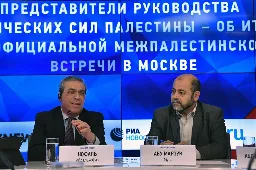
-
Deglobalization: The US Navy's Withdrawl as Global Protector

YouTube Video
Click to view this content.
- www.politico.com Why Biden has ‘no alternative’ to Netanyahu
The two men are refocused on something that has always united them: ensuring Israel’s security and long-term survival.
The two men are refocused on something that has always united them: ensuring Israel’s security and long-term survival.
The Palestinian militants who attacked Israel this weekend have done Benjamin Netanyahu a much-needed political favor: They’ve revived his foundering relationship with Joe Biden.
The decadeslong friendship between the Israeli prime minister and the U.S. president had been sorely tested in recent months as Biden urged Netanyahu and his far-right government to abandon efforts to overhaul Israel’s judiciary in ways many Israelis fear will destroy their democracy. Divisions in the Democratic Party over Israel continue to grow. Long gone were the days when Biden expressed outright “love” for Netanyahu — instead, Biden even delayed inviting him to the White House for months.
But the astonishing, multipronged attack by Hamas militants is sure to cast aside those frictions for now. Instead, the two men are refocused on something that has always united them: ensuring Israel’s security and long-term survival. And they’re doing so as both face complex political shifts at home — with their leadership on the line, and the prospect of a second Donald Trump presidency looming.
The crisis follows months of rising Israeli-Palestinian tensions, and as the Biden administration pursues a controversial peace deal in the Middle East that would establish Saudi-Israeli diplomatic ties. Yet the attack appeared to surprise both the Middle East and Washington.
-
Chinese People's Liberation Army (PLA) Navy submarine was allegedly fatally snared in an anti-submarine net intended for enemy submersibles
www.newsweek.com China submarine "sinking": Why Beijing's denials "mean little""Theirs is a brutal system as far as accidents are concerned," one expert told Newsweek of the alleged deadly disaster.
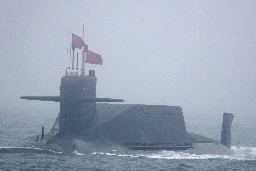
- www.cnbc.com Why China has its eye on Latin America
Even though thousands of kilometers separate them, China became Latin America & the Caribbean's second-largest trading partner in 2021. So, what is fueling China's interest in the region?
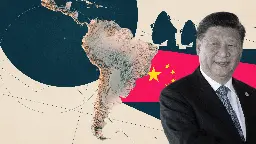
In the last 10 years, President Xi Jinping of China has had at least five different meetings with Venezuelan President Nicolás Maduro. The meetings culminated in an “all weather strategic partnership” in 2023.
But Venezuela is just one of the many Latin American countries that China is courting.
Even though thousands of kilometers separate them, China became Latin America & the Caribbean’s second-largest trading partner in 2021, with almost $450 billion worth of goods exchanging hands, up from $12 billion in 2000, or almost a 40-fold increase.
The region presents an attractive investment proposition for China because of its resources and markets, Margaret Myers, director of the Asia and Latin America Program at the U.S.-based think tank Inter-American Dialogue, told CNBC.
“In Latin America, China’s looking for soy, above all, to address what is a fairly critical food security challenge at home. ” Myers said.
- www.channelnewsasia.com Indonesia to launch China-funded high-speed rail, first in Southeast Asia
JAKARTA: Indonesia is set to launch Southeast Asia's first high-speed railway on Monday (Oct 2), a delayed multibillion-dollar project backed by China that will cut travel between the capital Jakarta and another m

Indonesia is set to launch Southeast Asia's first high-speed railway on Monday (Oct 2), a delayed multibillion-dollar project backed by China that will cut travel between the capital Jakarta and another major city by hours.
The Chinese-made bullet train named "Whoosh" is built to take more than 600 people to and from Jakarta and the Javan city of Bandung in 45 minutes and is part of China's Belt and Road infrastructure initiative.
President Joko Widodo has lauded the project for the fast ride it will provide between the two cities on Indonesia's most populous island Java, and he will inaugurate it on Monday, according to local media reports, citing officials.
-
South Korea holds rare military parade and warns North over nuclear threat
www.nbcnews.com South Korea holds rare military parade, warns North on nuclear threatThe parade marks the country’s Armed Forces Day, normally a muted event relative to the massive events the North has staged under leader Kim Jong Un.
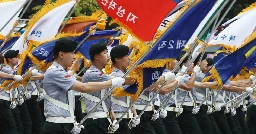
South Korea put on the first large-scale military parade in a decade on Tuesday, with weapons ranging from ballistic missiles to tanks rolling through Seoul in a show of force as it takes a tougher stance against North Korea.
The parade marks the country’s Armed Forces Day, normally a muted event relative to the massive events the North has staged under leader Kim Jong Un that include strategic weapons such as intercontinental ballistic missiles (ICBMs).
In a speech at Seoul Air Base, President Yoon Suk Yeol warned Pyongyang against the use of nuclear weapons and pledged to ramp up support for the military and the defense industry.
- www.bbc.com The shadowy Chinese firms that own chunks of Cambodia
Fifteen years after a deal to control a fifth of Cambodia's coastline, work has barely started.
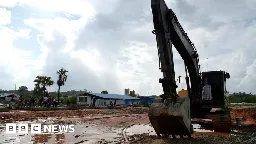
- apnews.com India had been riding a geopolitical high. But it comes to the UN with a mess on its hands
The recent G20 Summit hosted by India couldn't have gone better for Prime Minister Narendra Modi. But circumstances have changed — quite abruptly.
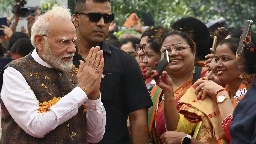
The Group of 20 Summit, hosted by India earlier this month, couldn’t have gone better for Prime Minister Narendra Modi. His pledge to make the African Union a permanent member became reality. And under his leadership, the fractured grouping signed off on a final statement. It was seen as a foreign policy triumph for Modi and set the tone for India as a great emerging power.
Foreign Minister Subrahmanyam Jaishankar was expected to seize on India’s geopolitical high in his speech at the United Nations on Tuesday. But circumstances have changed — quite abruptly — and India comes to the General Assembly podium with a diplomatic mess on its hands.
On Monday, Canadian leader Justin Trudeau made a shocking claim: India may have been involved in the killing of a Sikh Canadian citizen in a Vancouver suburb in June.



